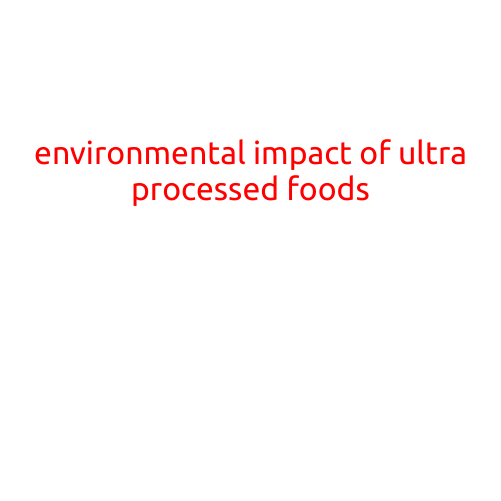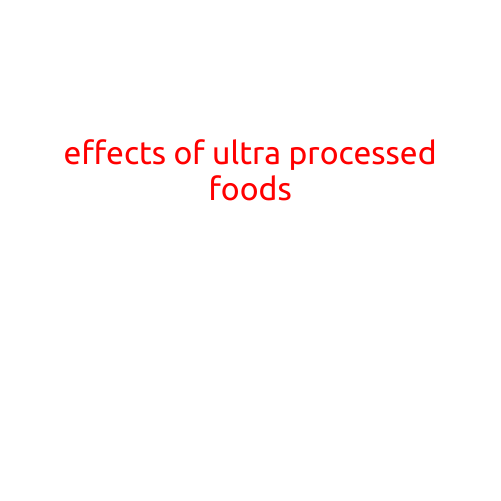
The Environmental Impact of Ultra-Processed Foods
The food industry has undergone significant changes over the past few decades, with the rise of convenience and ultra-processed foods (UPF) becoming increasingly popular. These packaged foods are often marketed as quick and easy options for busy lifestyles, but their environmental impact is a growing concern. In this article, we’ll explore the ways in which UPF contributes to environmental degradation and discuss the need for sustainable food choices.
What are Ultra-Processed Foods?
Ultra-processed foods are defined as products that contain a combination of various ingredients, including additives, preservatives, flavor enhancers, and coloring agents. They often contain refined or processed ingredients, such as vegetable oils, sugars, and salt, and may be sweetened or flavored with artificial additives. Examples of UPF include frozen meals, processed snacks, sugary drinks, and packaged baked goods.
The Environmental Impact of UPF
The production, transportation, and disposal of UPF have a significant impact on the environment. Here are some of the ways in which UPF contributes to environmental degradation:
- Energy Consumption: The production of UPF requires large amounts of energy, which is often generated by burning fossil fuels. This leads to greenhouse gas emissions, contributing to climate change.
- Land Use and Deforestation: The agriculture required to produce the ingredients for UPF, such as soybeans and corn, is a significant driver of deforestation and land degradation.
- Water Pollution: The processing and manufacturing of UPF releases pollutants into waterways, including chemicals, heavy metals, and microplastics.
- Waste Generation: UPF generates a significant amount of packaging waste, which is often made from non-biodegradable materials such as plastic and foil.
- Food Waste: UPF is often consumed and then discarded, leading to food waste and the associated environmental impacts of production, processing, and transportation.
- Supply Chain Inefficiencies: The global supply chain for UPF is complex and inefficient, leading to energy consumption, emissions, and waste generation.
Why UPF is a Problem
The rise of UPF has contributed to a number of societal and environmental issues, including:
- Obesity and Chronic Disease: Consuming high amounts of UPF has been linked to an increased risk of obesity, heart disease, and type 2 diabetes.
- Food Security: The environmental impact of UPF production, processing, and disposal threatens global food security, as resources are diverted away from sustainable agriculture and towards the production of processed foods.
- Economic Inequality: The proliferation of UPF has contributed to economic inequality, as the cheapest and most convenient options are often those with the highest environmental impact.
Solutions for a Sustainable Food System
To mitigate the environmental impact of UPF, individuals and policymakers can take the following steps:
- Increase Support for Sustainable Agriculture: Promote local, organic, and regenerative agriculture through subsidies, training programs, and labeling initiatives.
- Reduce Food Waste: Implement food recovery and redistribution programs, and encourage consumers to plan meals and shop more intentionally.
- Implement Extended Producer Responsibility: Make manufacturers responsible for the waste generated by their products, encouraging them to design packaging that is recyclable, reusable, or biodegradable.
- Promote Whole Foods and Home Cooking: Encourage individuals to cook from scratch using whole ingredients, reducing the demand for UPF and promoting more sustainable food choices.
- Foster a Culture of Sustainability: Educate consumers about the environmental impact of their food choices and promote a culture of sustainability through media campaigns, public policies, and community initiatives.
Conclusion
The environmental impact of ultra-processed foods is a pressing concern, as their production, processing, and disposal contribute to climate change, land degradation, water pollution, and waste generation. By promoting sustainable agriculture, reducing food waste, implementing extended producer responsibility, and fostering a culture of sustainability, we can work towards a more environmentally and socially responsible food system. As consumers, we have the power to make a difference by choosing whole foods and home cooking, and by advocating for policies that support sustainable food systems.





